
Past simple negatives and questions Page 3 of 3 TestEnglish
Level: Elementary (CEFR A1 to A2) Time: Approx. 15 minutes. . Download the PDF file by clicking on the gold. button below! Grammar Worksheet Past Simple: Negatives. 10 sentence exercise - write the sentences in their negative forms; with ANSWER KEY and percentage conversion chart. Intermediate Level. Approximately 15 minutes.

QUESTIONS AND SIMPLE PAST NEGATIVE English ESL worksheets pdf & doc
To make a question, just like the present simple, we change the position of 'was / were' and the subject. Here are the past simple 'yes / no' questions with 'be': And the 'wh' questions with 'be' (the question word just goes at the beginning, everything else is the same): And here's an exercise for 'wh' and 'yes / no' questions

Contoh Simple Past Tense Positive Negative Interrogative Dan Artinya Images
The past simple is the tense used to express situations, events and actions that happened in the past. When expressed in its negative form, the verb denies something about the subject. Form The past simple of both regular and irregular * verbs in their negative form has this structure: Subject + did + not + verb +.

Past Simple Questions Positive / Negative FREE English Tests Online
Past simple - negatives and questions. We use 'did' or 'didn't' in past simple negatives and questions. A1 - Elementary English grammar and exercises.
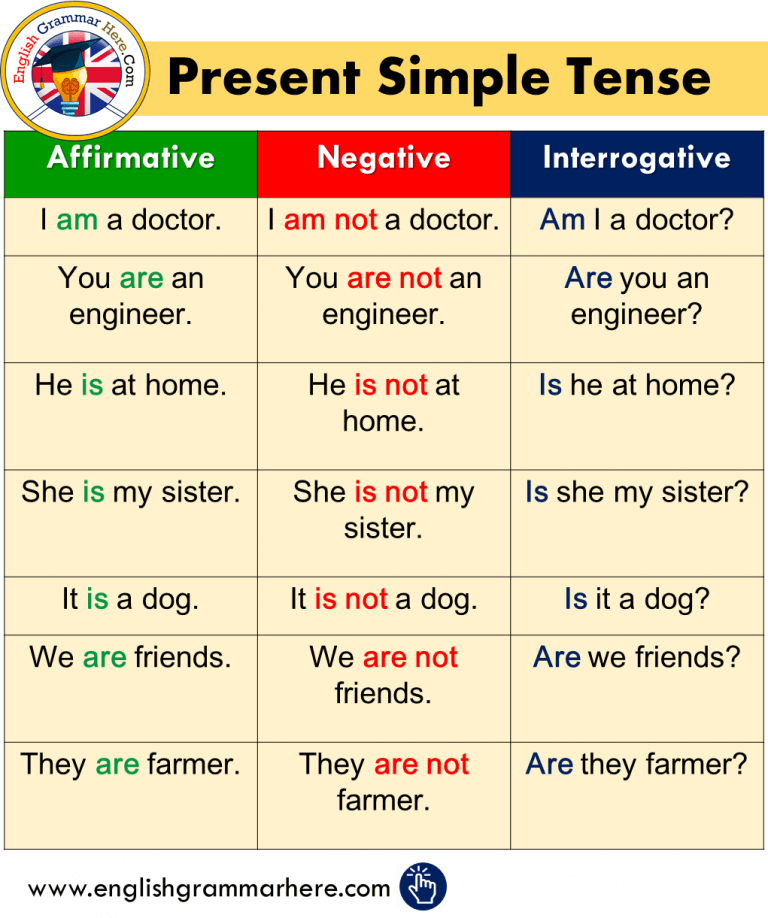
Past Simple Tense, Using and Examples English Grammar Here
Present simple and past simple questions and negatives For all verbs except be and have, we use do/does or did to make Yes/No questions in the present simple and past simple: For all verbs except be and have, we use do/does + not or did + not to make negatives in the present simple and past simple:

Past Simple positive, negative an… English ESL worksheets pdf & doc
We use Past Simple tense to ask and answer questions about actions or events in the past. Yes/No questions To create a question that will be answered with a 'yes' or 'no', use ' did ' (or ' didn't ' for a negative question) + base form of the verb ( infinitive without 'to'). Regular and irregular verbs To ask questions using Past Simple, we use:

Past Continuous Tense Affirmative, Negative, Interrogative English Grammar Tenses, Teaching
Grammar I didn't go, did you go? — Past simple negative and questions (all verbs) Past simple negative and questions (all verbs) For negatives and questions in the past simple tense, we use the auxiliary verb did — the past of "do". Compare: I don't like tomatoes. → I didn't like tomatoes. Do you live in London? → Did you live in London?
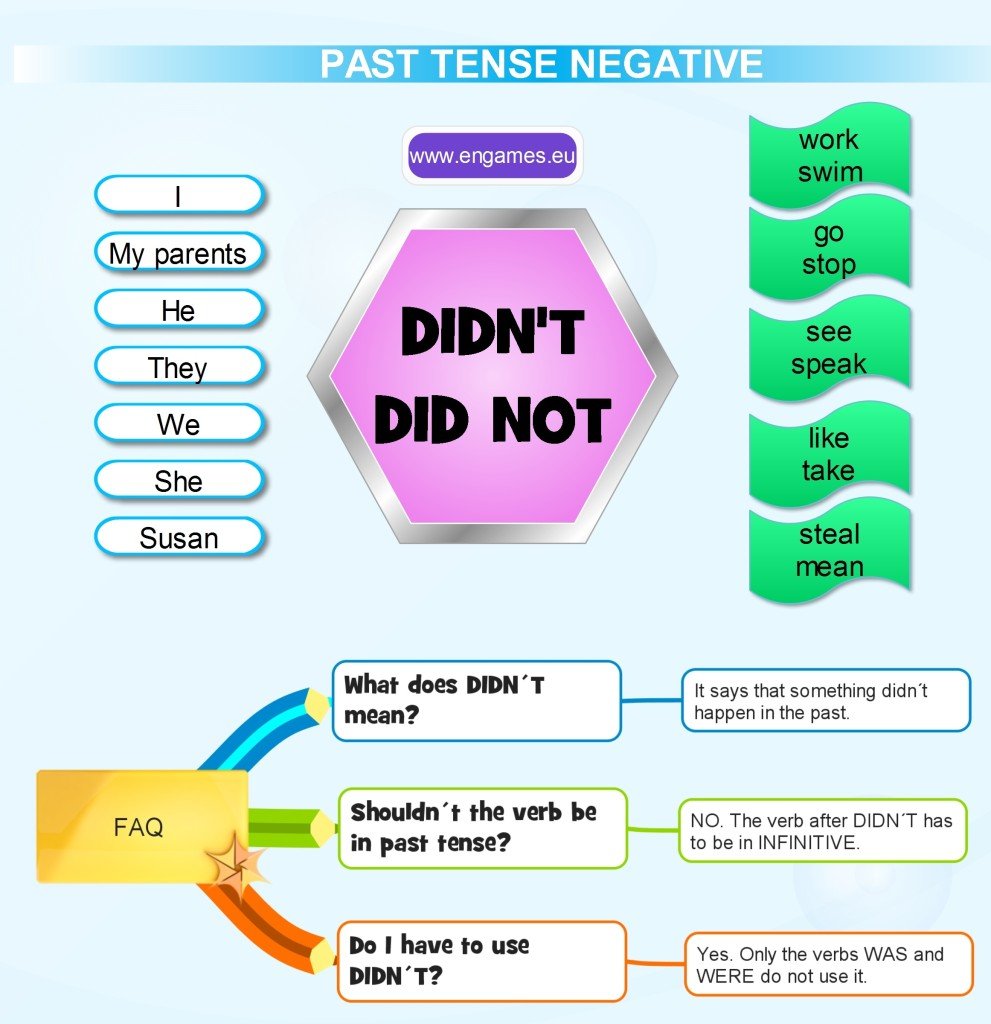
Past simple tense negative Games to learn English
Didn't is used to make negative sentences in the past simple tense. Remember, in the present simple tense, don't and doesn't are used. In the past simple tense, we only have one auxiliary: didn't. I didn't, you didn't, we didn't, they didn't, he didn't, she didn't, it didn't. Didn't is used for all subjects… it is so easy!

Past Simple negative activity Simple past tense, Past tense worksheet, Simple present tense
Affirmative - negative - questions. Positive / negative / questions. Past simple - multiple choice. Correct simple past form. Past simple - exercises. Simple past tense. Past life 1. Past life 2.

English Grammar PAST SIMPLE Negatives
Access a collection of 101 printable PDF worksheets focusing on the English grammar topic of the past simple negative.Download fill-in-the-blank tests with exercises and answer keys for past simple tense negative form to print for free. The activities in the sheets are suitable for kids, adults, ESL learners at the beginner, elementary, and intermediate levels to practice English grammar.
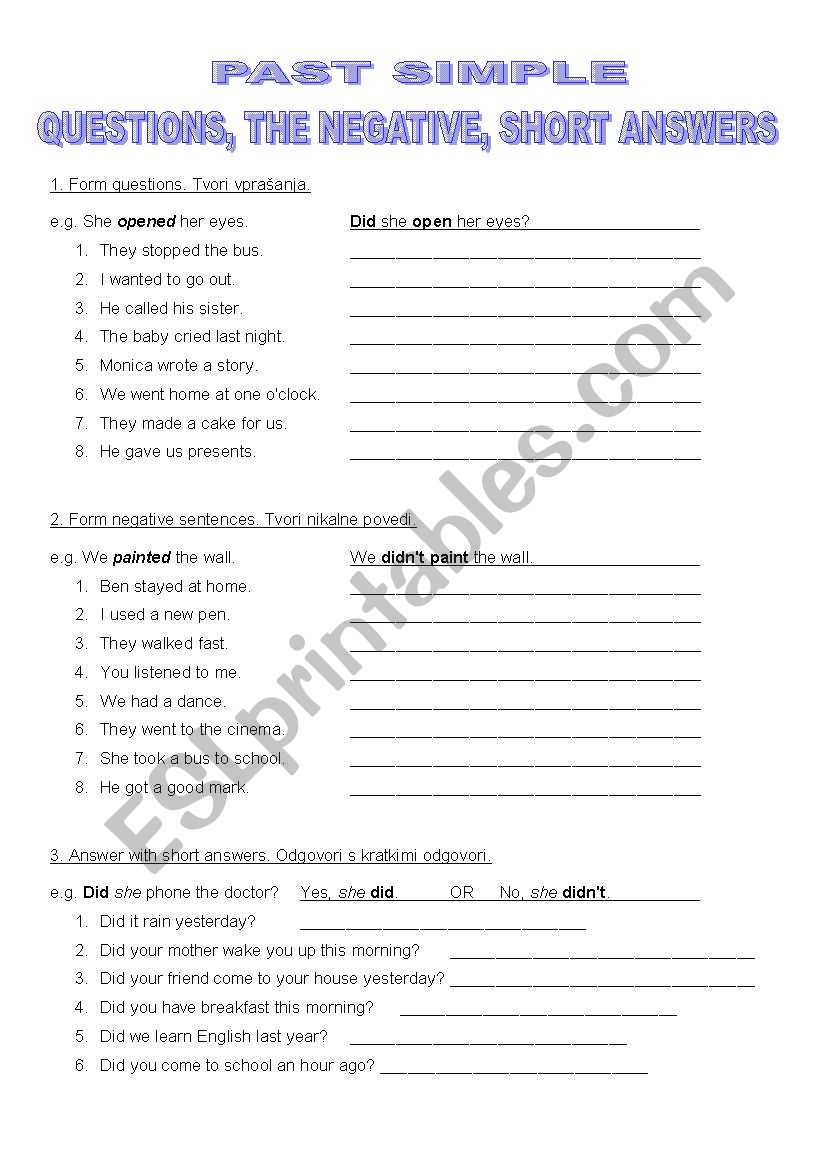
PAST SIMPLE QUESTIONS, NEGATIVE, SHORT ANSWERS ESL worksheet by sinja
Past simple 1 Past simple 2 Past simple questions and negatives We use did to make questions with the past simple: Did she play tennis when she was younger? Did you live abroad? When did you meet your wife? Where did you go for your holidays? But questions with who often don't use did: Who discovered penicillin? Who wrote Don Quixote?

Review 6 Past Simple (negative and questions) worksheet
Negative: regular and irregular. Negative forms - irregular verbs. Past simple - negative forms. Past simple: negative - write. Affirmative / negative 1 - write. Affirmative / negative 2 - write. Negation of sentences 1. Negation of sentences 2. Negations of English sentences.
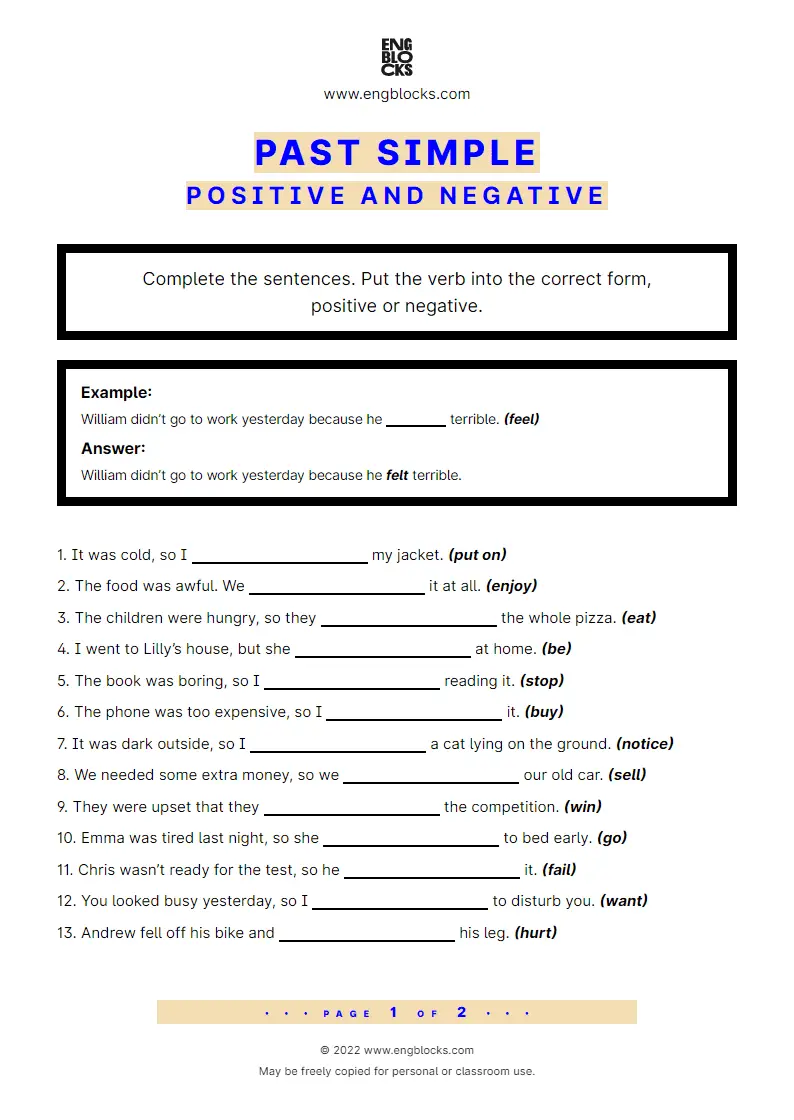
Past Simple Positive and Negative Worksheet English Grammar
Use of the board. The students learn how to form negative sentences in the past simple tense. Start off by writing a basic affirmative past simple statement and eliciting its negative equivalent. After that, you can use the visualisation to step through some more examples. If you can, lean on the students' L1 and have them translate some simple.
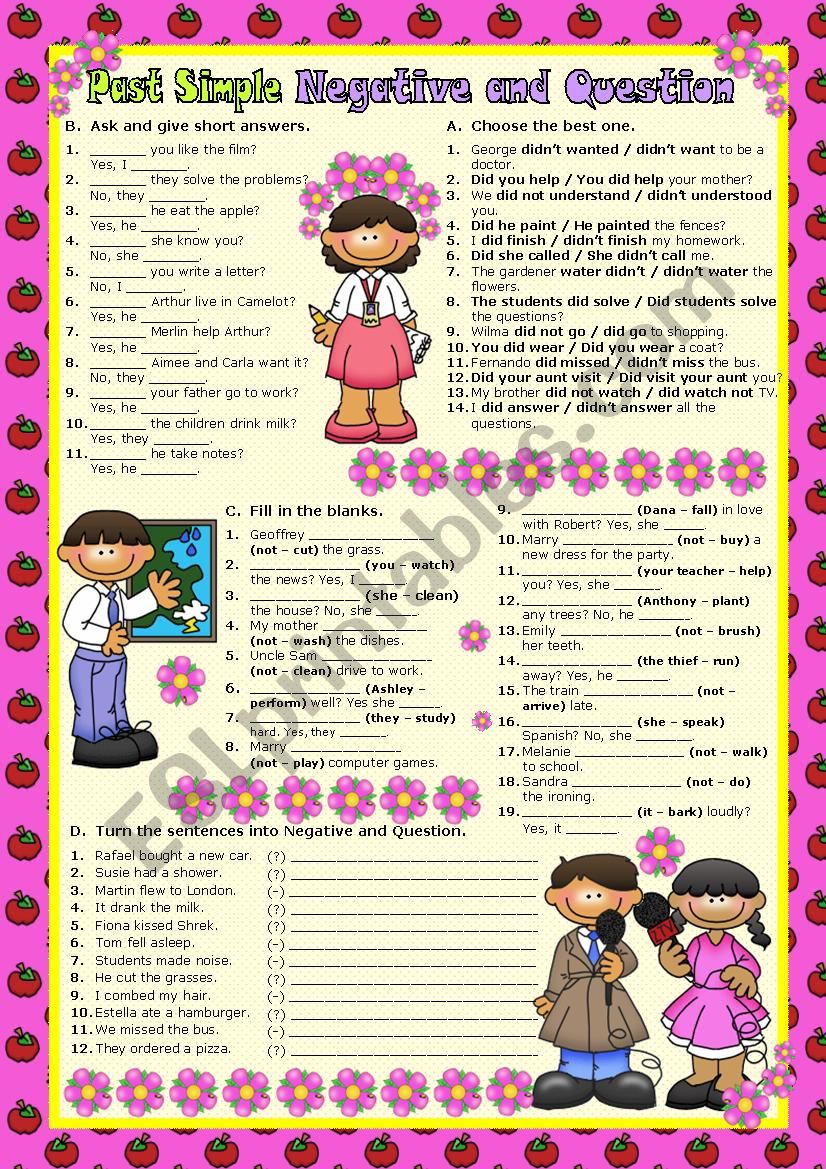
Past Simple / NegativeQuestion ESL worksheet by lady_gargara
Past Simple - QUESTIONS and NEGATIVES Game Code: 86892 English 16 Public Practice Past simple structure. Show Hide Study Slideshow Alejandra Gonzalez 152 She talked to Joe an hour ago. *CREATE A QUESTION* 15 I bought fruits and vegetables. *CREATE A NEGATIVE SENTENCE* 15 We watched a horror movie, last night. *CREATE A QUESTION* 15

50 Sentences of Simple Past Tense (Affirmative, Negative, Questions) Simple past tense, Past
Positive, negative, questions: write 3. Past simple irregular : write 1. Past simple irregular : write 2. Regular/irregular verbs. Past simple - Form and use. Negatives and questions. Sentences and questions 1. Past tense - irregular verbs. Present simple / past simple.
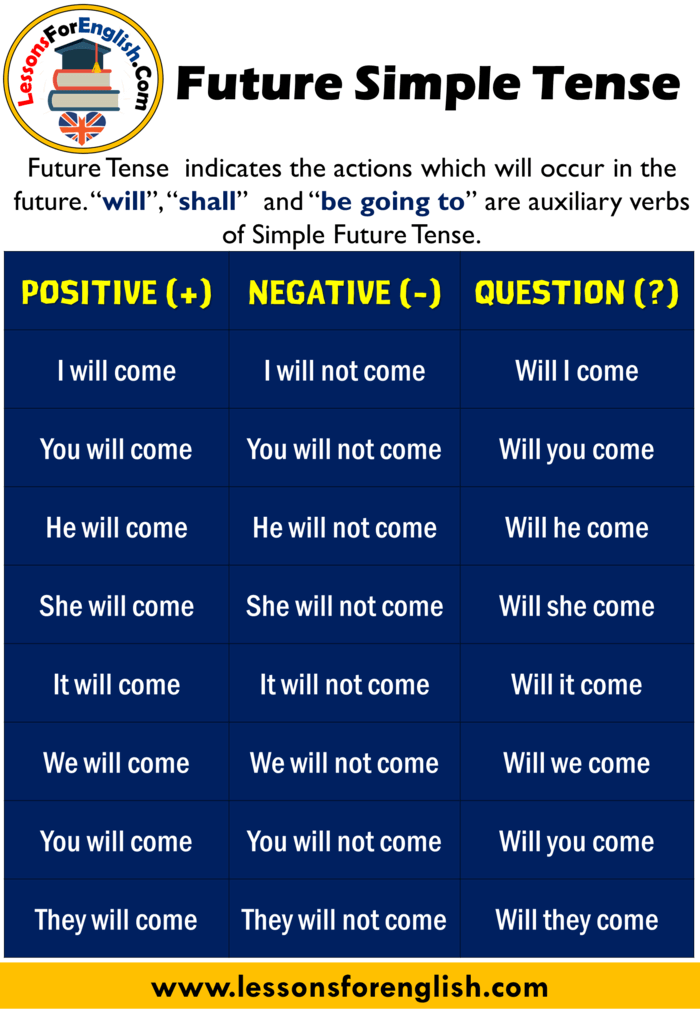
Future Simple Tense, Positive, Negative and Question Form Lessons For English
The online exercises on this page will provide you with the necessary practice of making negative and interrogative sentences in the past simple. Recommended for beginners. If you are not sure how to make affirmative sentences in the simple past, we suggest studying "Past simple positive" first. You can find the links in the related topics.